It’s been our privilege to welcome a group of five fantastic interns to the Press this summer for our first ever remote internship program—and it’s our pleasure to introduce you to each of them here. Check back here for #MeettheInternMonday as we post new 60-Second Q&As for the next five weeks.
P.S. Interested in a remote internship with us this fall? Applications are due July 1. Learn more.
Meet Lee
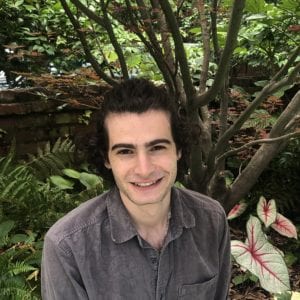 CCP: What’s your favorite aspect of the intern experience at Copper Canyon Press so far?
CCP: What’s your favorite aspect of the intern experience at Copper Canyon Press so far?
L: I really appreciate the responsibility with which the Press has trusted us interns. I’ve always wanted to be involved in getting poetry to the people, and I love getting my hands dirty as soon as possible when starting a new project. From the beginning, staff have trusted us with serious tasks: interacting with manuscripts that have just arrived at the Press and helping to prepare for the seasonal sales meeting. I’ve learned so much from the work we’ve already done, and the Copper Canyon staff continue to be a wonderful community of mentors as we interns get familiar with the ins and outs of nonprofit publishing.
CCP: Please tell us about a forthcoming Copper Canyon title you’re excited about, and why.
L: I’m grateful for the opportunity to have read the manuscript for Arthur Sze‘s upcoming collected works. Sze’s images, which masterfully link the mind and the body with language, somehow manifest both the visceral and the serene in a way that continues to inform my understanding of the way we interact with the world. Though I’m most looking forward to his new poems, I’m also excited for readers unfamiliar with his work to have access to (nearly) all of his poems in a single volume!
CCP: Please give us a line from a poem that you can’t get out of your head.
L: Lines from Adrienne Rich’s “Diving Into the Wreck” have been echoing in my brain lately. She writes, “the thing I came for: / the wreck and not the story of the wreck / the thing itself and not the myth.” For one, I continue to reckon with the capitalist myths that undergird the wreck of institutional racism. I’ve also been thinking about what makes a poem great, and found some understanding here. These lines are a brilliant “ars poetica”—as I read them, Rich tells us that great poetry, paradoxically, must embody and contend with both “things” and their contexts, without being able to fully manifest a “thing” or explain a history.
Meet Rachel
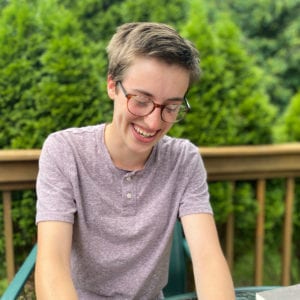 CCP: What’s your favorite aspect of the intern experience at Copper Canyon Press so far?
CCP: What’s your favorite aspect of the intern experience at Copper Canyon Press so far?
R: Every facet of Copper Canyon is constantly engaged with all kinds of groundbreaking, artistic collaborations. It’s amazing to look behind the curtain at how a book gets made—and to ultimately aid in developing incredible, new art. I have always loved and needed poetry, and now I am a part of bringing it into the world. As interns, we are deeply involved in the operations of the press, and I feel so proud to have a role in these collaborative, poetic processes.
CCP: Please tell us about a forthcoming Copper Canyon title you’re excited about, and why.
R: I’m definitely excited about Cardinal, Tyree Daye’s new book (fall 2020). He’s such an intelligent and visual writer, and his imaginative use of language is really exciting to see on the page. I love how he can carry an image across poems, and by doing so he can transform that image right before our eyes. His work is so visceral and necessary.
CCP: Please give us a line from a poem that you can’t get out of your head.
R: I’ve had Yeats’s “The Lake Isle of Innisfree” in my head for weeks. I’m captivated by its rhythm and its turn towards a not-so-isolated isolation. “I will arise and go now, and go to Innisfree… and live alone in the bee-loud glade.” The speaker is on the precipice of aloneness, but he fills the poem with all the ways he won’t be alone. I think this has been an important tension for me to live in, especially during this moment where it’s so easy to feel physically or sociopolitically isolated. Yeats offers a new way to hold all of that.
Meet Jenna
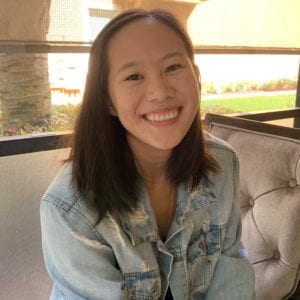 CCP: What’s your favorite aspect of the intern experience at Copper Canyon Press so far?
CCP: What’s your favorite aspect of the intern experience at Copper Canyon Press so far?
J: I really appreciate how invested the Press is in ensuring that the internship is a meaningful and educational experience. It’s been enlightening to learn about all the different aspects of publishing a book—from editing to production to marketing to development—and deeply fulfilling to engage with parts of the process and offer creative input. Foremost, I get to spend time with poetry, read and write in a collective, creatively energetic space—it’s a gift of a summer.
CCP: Please tell us about a forthcoming Copper Canyon title you’re excited about, and why.
J: I loved reading Water I Won’t Touch by Kayleb Rae Candrilli (spring 2021). Its Appalachian foothill familiarity. How they write this landscape, this body of tenderness and rust, violence, longing, and love. Kayleb has such a gift for writing beauty that, while complicated, remains uncompromised. There’s a non-plaintive hope to this collection, that in the task of living, the smallest joys are never scarce.
CCP: Please give us a line from a poem that you can’t get out of your head.
J: Jericho Brown’s “’N’em” has been staying with me since a virtual reading last week. The poem remembers an older generation, cultivates familiar relation and idiosyncratic feeling, ends “Then another century came. People like me forgot their names.” I’ve been thinking lately about how to hold onto the entropy of a moment, of a collective as it’s taken into history. This is a way that feels loving and un-romanticized.
Meet Kayli
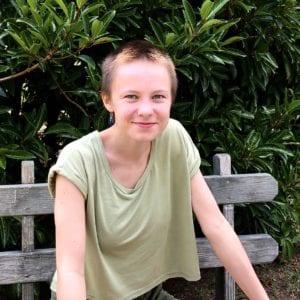 CCP: What’s your favorite aspect of the intern experience at Copper Canyon Press so far?
CCP: What’s your favorite aspect of the intern experience at Copper Canyon Press so far?
K: I’ve really been blown away by how warm and welcoming Copper Canyon Press has been as we join the team remotely. It’s incredible to form a community around poetry even as we are all scattered across the country and only speak through our computers. This feeling of closeness even over distance extends to the work we’ve been given as well. I love curling up on a couch at home and digging into a manuscript written by someone hundreds or thousands of miles away, and feeling trusted by the author and the Press to treat that collection with care and respect.
CCP: Please tell us about a forthcoming Copper Canyon title you’re excited about, and why.
K: I can’t wait to hold Nikki Wallschlaeger’s book Waterbaby (spring 2021) in my hands. Nikki writes from a really powerful place of tragedy and exhaustion blended with humor, and she has a knack for delivering truth: “perhaps it’s best not to trust / the politics of people who / haven’t washed their own / dishes in twenty years.” I love how this book feels both transcendent and un-precious, and Nikki’s voice is so wry, so true, so necessary. I want everyone to read her work and then move through their days with her beautiful, devastating lines echoing in their heads.
CCP: Please give us a line from a poem that you can’t get out of your head.
K: I think a lot about the very last lines of Jericho Brown’s poem “Say Thank You Say I’m Sorry,” which he published last month about life during the pandemic. The poem begins “I don’t know whose side you’re on, / But I am here for the people / Who work in grocery stores that glow in the morning” and ends “They have washed their hands for you. / And they take the bus home.” This poem makes me think of the sacrifices people make for each other, chosen and unchosen, and how “natural” disasters like a pandemic are shaped by humans and the systems we’ve built that prioritize some people over others.
Meet Peter
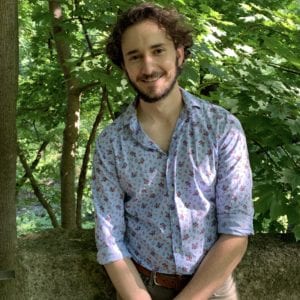 CCP: What’s your favorite aspect of the intern experience at Copper Canyon Press so far?
CCP: What’s your favorite aspect of the intern experience at Copper Canyon Press so far?
P: The enthusiasm with which everyone at Copper Canyon has committed themselves to giving us the best intern experience we can have despite the unprecedented shift to a virtual workplace has been really wonderful. My mailbox seems magically to be refilling with Copper Canyon titles every time I get the mail as the Press goes out of its way to get us familiar with the backlist, something we could normally do just by browsing the shelves in the office. Everyone’s been so generous with their time and expertise as well, meeting with us over Zoom or over the phone to get us involved in as many projects as possible, even when doing so takes more time than sitting down in person would. I’ve absolutely felt like folks here want to teach us as much as they can about the publishing industry, and I already feel like I’ve learned so much.
CCP: Please tell us about a forthcoming Copper Canyon title you’re excited about, and why.
P: I cannot wait for The Essential June Jordan (spring 2021). June Jordan feels like one of those poets you could (re)turn to in any context and find just what you needed most. She can get you good and angry about the systemic injustice of the world we live in when you need constructive anger to get you going. But with Jordan, outrage never replaces joy. She’s too complex for that, and she knows life’s too complex for that. That’s why her most political moments are followed (in the next poem, or even in the same one!) by her most intimate celebrations of herself, her loved ones, and people across the globe. She refuses defeat outright and on every playing field. If I ever start feeling skeptical about the power of poetry, I turn to Jordan to remind me of what’s possible. I’m hoping the Essential will help readers all over do the same.
CCP: Please give us a line from a poem that you can’t get out of your head.
P: I’ve been thinking a lot about Muriel Rukeyser’s long poem “The Book of the Dead” lately, especially in light of the nation-wide protests of the last couple months, in which those in power have displayed no regard for the health and wellbeing of protestors seeking the recognition of only very fundamental rights. The use of tear gas and its respiratory effects especially remind me of Rukeyser’s poem, in which another respiratory disorder, silicosis, is the result of the utter apathy towards human lives on the part of the powerful. Rukeyser unflinchingly holds the reader accountable with her use of the first person plural while also insisting, like I do today, on hope: “These are our strength, who strike against history / These whose corrupt cells owe their new styles of weakness / to our diseases.” Systemic inequality implicates us all in a history of violence, but we can choose to strike against history.